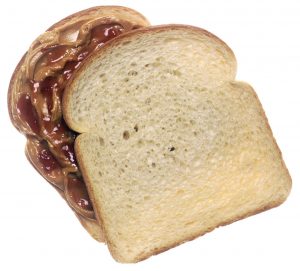 Hey, everybody. Thanks for checking in with me at the blog. If you are new to MyHealthyMatters, this is the companion blog to my weekly radio show, coincidentally called HealthyMatters. The show airs on Sunday mornings, at 7:30 a.m. Central Time on WCCO 830 AM radio in Minnesota and surrounding states and streams live at that time on wcco.com if you aren’t in our part of the world. Anyway, thanks for spending some time with me on the blog. Go ahead and subscribe by e-mail (at upper right or at the end of this post) if you like what you see.
Hey, everybody. Thanks for checking in with me at the blog. If you are new to MyHealthyMatters, this is the companion blog to my weekly radio show, coincidentally called HealthyMatters. The show airs on Sunday mornings, at 7:30 a.m. Central Time on WCCO 830 AM radio in Minnesota and surrounding states and streams live at that time on wcco.com if you aren’t in our part of the world. Anyway, thanks for spending some time with me on the blog. Go ahead and subscribe by e-mail (at upper right or at the end of this post) if you like what you see.
Preview of this post
Here’s what I’ll cover today:
- The sordid past of sugar and fat research.
- The great sugar vs fat debate of 1967. And 1987. and 2007. And today. This is one debate that never seems to go away.
- A few words about processed foods.
- And of course, links to further information for the extra-curious reader. You know who you are.
So with apologies to Mary Poppins, here we go . . .
Is Big Sugar the next Big Tobacco?
This week has seen some news in the medical literature that made it into the regular press. It’s about sugar in our diets and the perhaps bad advice people have been getting over the past several decades. I can’t resist writing my thoughts on this subject even though I am not an expert on nutrition. As a doctor for adults (my specialty is Internal Medicine which means I’m an internist which means I care for adults), I see the consequences of our diet every day: obesity, diabetes, heart disease, joint problems, and on and on and on.
This post also follows up my previous post called “I eat too much butter” which you may want to check out by clicking the link. That post was mostly intended to be about staying motivated to eat healthy, and on one particularly day I had eaten rather poorly (not a single vegetable that day, if I recall). That post has proven to be one of the most popular to date on MyHealthyMatters and was recently reprinted in Minnesota Medicine magazine’s food and nutrition issue with some slight modifications and much better graphics.
Intrigue in the sugar industry
The article I am talking about appeared in JAMA Internal Medicine, which is a highly-regarded medical journal that doctors and scientists read and get excited about. For the rest of you, it may rival a tranquilizing dart in overall effectiveness at inducing sleep. Fortunately, this one also made the media that real people read so we can learn all about it from press. But if you want to see the original journal article you can look in up in JAMA Internal Medicine. I can’t easily put a link to it because most medical journals like this require a login or an account and well, basically I tried and couldn’t get it to work.
The gist of the article is simple: there is evidence that in 1967 the sugar industry did its best to downplay any health risks of sugar and shift the blame to fat in the diet.
Rather reminds me of another industry – tobacco – who did similar questionable stunts to cover up what they already knew about the health risks of their product. In the name of balance and fairness, the standards of conduct regarding scientific research were different 50 years ago, but by today’s standards the sugar industry did a doozy of bad behavior.
Now this was in 1967, a long time ago. So you may rightfully be asking why this makes any difference now in 2016. Good question. Let’s turn to Euripedes for the answer, because who better than a classical Greek playwright to sort our 20th century cover ups?

“When one with honeyed words but evil mind persuades the mob, great woes befall the state.”
Let’s parse the quote:
One with honeyed words = The sugar industry in 1967 in cahoots with some researchers who should have known better. Did you catch the honey (yes, a sugar) in this quote?
Persuades the mob = telling us all for decades that eating less fat for our health will lead us to eat more sugar in its place and by extension, make the sugar people rather wealthy. This is pretty much what happened in reality.
Great woes befall the state = the obesity and diabetes epidemics and the ongoing prominence of heart disease which we have today.
As reported in the New York Times and elsewhere like National Public Radio, the sugar industry, through its Sugar Research Foundation, funded research whose specific purpose was to make saturated fat the culprit for heart disease and make sugar seem much safer. For the fuller story, read the Times article. Basically they found original documents from this group whose raison d’être is to promote the sugar industry. Those documents clearly show that the sugar industry expressly wished to have sugar look safer than fat, regardless of what the science says. And there was actual research being done back then trying to answer that very question. Should we eat more fats? Or sugars? And the answer was not clear.
Show me the money!
You should know that much medical research today, as in 1967, is funded by industry. The remainder is funded by government agencies, typically through the National Institutes of Health here in the United States. The implications of any research that is funded by private commercial interests is that the results may show bias – that is, there are important but sometimes subtle ways the research could not be entirely free from pressures and factors that will lead it to making incorrect conclusions that benefit the funding organization.
Most bias in research today is rather subtle. But there was nothing subtle at all about the bias in the 1967 sugar vs fat study at Harvard. There was a documented goal of exonerating sugar and demonizing fat as a risk for coronary heart disease. What’s more, the Harvard researchers published their study in the very prestigious New England Journal of Medicine without disclosing the funding source from the Sugar Research Foundation.
Such practices are thankfully extremely rare today, but in 1967 not even the New England Journal of Medicine required researchers to disclose where the money was coming from. Today, disclosure of such financial ties is the norm – definitely a good thing – since industry funding of research is here to stay. Here is a link to the original 1967 NEJM article. I personally have problems with industry-funded research. I know many don’t agree with me on that – but that is a post for another time.
What it means for you
So this is all a bunch of nerds and lobbyists in the 1960s talking about something they knew relatively little about. What should we learn from it today?
As much as this sounds like I’m going to go all anti-sugar on you, that’s not what I hope to do. But here’s a few take-home points:
- Dietary guidelines do still call for limits on fats, especially saturated fats, in your diet. Check out US guidelines here. This is because the best science we have to date still suggests that a high-fat diet is a risk-factor for coronary heart disease. I refer you back to my earlier post “I eat too much butter” for more on this.
- That being said, there is growing evidence that sugar in the diet, particularly added sugars and simple sugars, are an additional risk for heart disease. I think we all know that obesity is at epidemic levels in the United States and I think it reasonable to conclude that simple sugars are contributing to that problem. But heart disease? Yes, indeed. Check out this commentary from Harvard for a good overview on the subject. Still not convinced? Read this from the American Heart Association which reports on a 2014 study on the subject.
- So fat is bad, sugar is bad. Sounds like we all should eat tree bark and roots or else we’re doomed. Hard to know what to eat. My personal take on this is that you should eat a balanced diet that is loaded with as many whole, unrefined foods as you can get your hands on.
This means:
- lean meats and fish
- lots and lots of vegetables, especially colorful ones (go for the dark green and orange veggies)
- whole grains
- fruits and berries
- for many people – dairy products, including the protein packed ones like yogurt and milk
- nuts
It also means avoiding – or at least severely limiting your intake – of things like:
- anything with added sugar (soda pop and energy drinks are huge culprits)
- table sugar
- simple carbohydrates are really sugar in disguise, so perhaps limit the amount you eat of simple or refined carbs like pasta, rice, white breads . . .
- candy
- chips and other snack foods
What about processed foods?
I feel strongly about this one. Highly processed foods are rarely good for us, in my opinion. So I recommend that people avoid these to the degree they can. But some clarification is in order about the very word processed – what does it mean?
Processing is not always bad. The milk in my fridge was processed – they added Vitamin D – which is a good thing. The frozen veggies or canned beans were processed to capture them at their most fresh. And there is more lycopene in canned tomato paste than in fresh tomatoes and that stuff is supposed to be really good for you! All examples of processing that are probably a pretty good thing.
And if getting fresh vegetables and fruits is not easy for a person – for financial reasons (fresh foods can be expensive!) or lack of ability to get to the store often enough to make buying fresh practical, then a can of fruit or a bag of frozen spinach is a healthy option. So score one for some processed foods.
 The processing that is more concerning is more about what is not in the food product after processing, not what is in it. An example is white bread. By the time they refined that bread to make it soft and fluffy so your kid will eat his peanut butter and jelly sandwich on it, there is probably not an intact food fiber left in it. The fiber has been refined to extinction. That’s processed food that is not as good for you.
The processing that is more concerning is more about what is not in the food product after processing, not what is in it. An example is white bread. By the time they refined that bread to make it soft and fluffy so your kid will eat his peanut butter and jelly sandwich on it, there is probably not an intact food fiber left in it. The fiber has been refined to extinction. That’s processed food that is not as good for you.
And anything frozen, or boxed, or bagged into a convenience-type of food is almost certainly chock full of added sugar, salt, and fat. Not to mention preservatives. That’s how they make it reasonably tasty so you’ll actually eat it. But healthy? Nope.
Some of the best advice I ever read was from author Michael Pollan. In his book, In Defense of Food, he advises that we follow 7 words when considering our diet. Here they are:
“Eat food. Not too much. Mostly plants.”
That’s a pretty good diet strategy in 7 words. The first part means eat whole and real foods, not refined ones. The second part is self-explanatory. And the third bears repeating; that a plant-based diet is probably best (I believe that the best diet for ourselves and even more so for the planet is a vegetarian diet). Good advice, Mr. Pollan.
Want to learn more about processing and foods? Check out this page from the Academy of Nutrition and Dietetics.
Maybe just talk to an expert
For the best advice on diet, I do always recommend you consult a dietician. They are people with initials RD after their name.
Most clinics and hospital systems employ lots of them, so that’s a place to start if you want to learn from the experts. Their professional organization is the Academy of Nutrition and Dietetics and I found their website, with the no-nonsense name eatright.org to be full of good information.
Hope this got you thinking a little bit. Thanks for reading!
David
